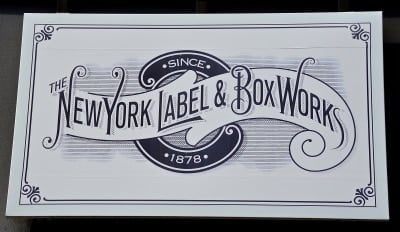Proud To Be Labeled A Deming-Inspired Company
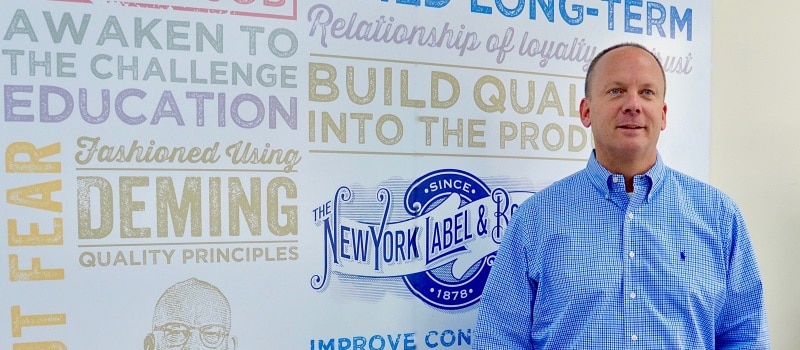
Ask Steven Haedrich about his goal in life, and he’ll tell you straight away, “I’m on a mission to create a company so successful, it will once again show the power of Deming’s methods.” That might seem like a tall order. However, when you understand what makes Steven tick, and recognize what his company, New York Label & Box has accomplished by applying the teachings and practices of W. Edwards Deming, you welcome his boldness and can’t help but cheer him on.
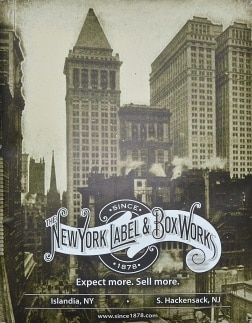 New York Label & Box (NYLB) has been in continuous operation for 136 years. Founded by Herman Hug in Manhattan in 1878, the company was purchased by Steven’s grandfather in 1930. Since then it’s been family run, with Steven and his father buying out the other family interests in 1996. Today, the company is located in Islandia, NY, on Long Island and South Hackensack, NJ, and specializes in innovative labels and packaging, such as resealable labels, UV inks and expandable carton packaging. By all accounts the business is thriving. Worker turnover is virtually zero. The management team has been intact for over 20 years. Its customer base is solid and profitable. But not too long ago, New York Label & Box was in a very different state of affairs. What Steven characterizes as nothing less than a crisis.
New York Label & Box (NYLB) has been in continuous operation for 136 years. Founded by Herman Hug in Manhattan in 1878, the company was purchased by Steven’s grandfather in 1930. Since then it’s been family run, with Steven and his father buying out the other family interests in 1996. Today, the company is located in Islandia, NY, on Long Island and South Hackensack, NJ, and specializes in innovative labels and packaging, such as resealable labels, UV inks and expandable carton packaging. By all accounts the business is thriving. Worker turnover is virtually zero. The management team has been intact for over 20 years. Its customer base is solid and profitable. But not too long ago, New York Label & Box was in a very different state of affairs. What Steven characterizes as nothing less than a crisis.
A Wake-Up Call To Quality
Even under the best conditions, running a small company is never easy. There’s always a big list of challenges; meeting payroll, paying suppliers, servicing customers, trying to invest in new equipment, hiring and training, tackling new and existing problems. But nothing quite compares to the specter of losing your largest customer. This is exactly the situation Steven found himself in shortly after taking over the day-to-day operations in 1996. As he describes it, “My largest customer at the time, Hue Hosiery sent a 30-page form letter to all its vendors that in a nutshell said, “Our quality is paramount upon our supplier’s quality and we are asking you to improve your quality.” With that edict, I essentially began to read everything I could about quality.”
In his pursuit to learn more about quality, Steven discovered, “In every book I read, or every turn I made, I saw Deming’s name. And one of his books kept coming up, Out Of The Crisis.” To say this seminal work of Deming spoke to Steven is an understatement. “When I saw the title, it hit me hard, because crisis is what I felt I was in most of the time.” And according to Steven, “You could have inserted New York Label as the manufacturing example in the book. The problems that Deming talked about and the old way of thinking fit us to a tee.”
Although Deming’s theories and practices on improving quality resonated with Steven, and he was certain he had “found the right guy, and the right philosophy”, he still needed to figure out how he was going to implement this “new way of thinking” at New York Label. His solution was to hire Rafael Aguayo, the author of the book, Dr. Deming: The American Who Taught the Japanese About Quality, as a full-time consultant to New York Label. Steven had come across Rafael’s piece on Deming while doing research on the topic of quality, and at the time, Rafael just happened to be living nearby in Brooklyn.
Gathering The Low Hanging Fruit
Starting in 1997, and over the course of the next two years, with Rafael’s guidance and Steven’s leadership, the company made significant strides in implementing many of Deming’s key tenants, particularly those expressed in his illuminating declaration, The 14 Points For The Transformation Of Management. At New York Label, this meant removing sales quotas and performance reviews, eradicating “command and control” management practices, promoting teamwork and collaboration, practicing systems thinking, and tying sales and growth directly to improving quality. With a cultural shift around quality firmly in place, and the company making what appeared to be steady improvements from the shop floor to customer service, Steven believed he and his management team could carry on without Rafael’s involvement.
Looking back at this decision, Steven recalls, “We were able to integrate Deming’s philosophy into the culture of the company, and had a pretty good grasp of certain concepts, like common cause and special cause variations. But I now realize this was really just the low hanging fruit.” Indeed, after a number of years of going it alone, Steven sensed his efforts around implementing Deming and improving quality at New York Label had plateaued. This was less out of complacency and more out of a lack of a greater understanding of Deming’s practices. Steven explains, “We weren’t able to see the importance of all the components and their relationship within the system, including outside suppliers and customers.”
Carpe Diem
Fast forward to 2006. The marketplace was beginning to cool down putting more pressure on big and small businesses alike. Many companies turned to standard quick fixes to improve the bottom line, such as laying-off workers, cutting back services, squeezing more dollars out of suppliers, buying up smaller companies and exercising creative accounting practices. But not New York Label. Instead, Steven redoubled his efforts around Deming. He created a new position in the company, Head of Quality, and selected Anthony Masotti to take on the role. Anthony was a long-time employee of New York Label with a deep appreciation for Deming’s theories and teachings. One of the first steps Anthony took was to attend a two and a half-day seminar developed by The W. Edwards Deming Institute entitled, 27 Reasons Why Businesses Fail. Patterned on Deming’s famous Four-Day Seminar, this compressed format was led by Kelly Allan, a consultant with years of experience helping companies successfully implement Deming’s management philosophy. Steven describes the outcome of Anthony’s experience, “He returned from the seminar energized. It confirmed that Deming was the right way to go. But more importantly, we had a lot more to learn and a lot more work to do with Deming.”
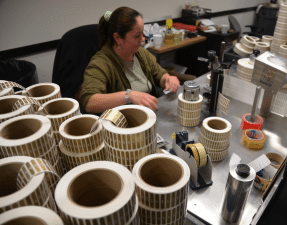 An initial assessment of New York Label found they had a solid understanding of the Psychology component from Deming’s System of Profound Knowledge, and had built a really strong corporate culture because of that. They also understood Variation and had a good grasp of operational definitions, but needed work around Deming’s Appreciation For A System and Theory of Knowledge, including running more effective PDSAs. As Kelly’s involvement with the company enters its second decade, their understanding and practice of Deming’s management philosophy has significantly deepened, leading to much of the success the company has experienced. When you talk with Steven about New York Label, there is passion in his voice. The conversation moves at a steady clip. Nothing is sugar coated or circumspect. He is clear about his beliefs, and open and honest about his feelings. What emerges is the picture of a thoughtful, fair-minded business owner with a thirst for quality and continual improvement. But listening to him tell the story of how his company has changed for the better because of Deming, you get a sense that perhaps Steven’s best quality as a leader is his courage to take action in a timely fashion. Which helps explain why shortly after Anthony returned from the two and a half-day seminar, Steven engaged Kelly Allan as a consultant to New York Label.
An initial assessment of New York Label found they had a solid understanding of the Psychology component from Deming’s System of Profound Knowledge, and had built a really strong corporate culture because of that. They also understood Variation and had a good grasp of operational definitions, but needed work around Deming’s Appreciation For A System and Theory of Knowledge, including running more effective PDSAs. As Kelly’s involvement with the company enters its second decade, their understanding and practice of Deming’s management philosophy has significantly deepened, leading to much of the success the company has experienced. When you talk with Steven about New York Label, there is passion in his voice. The conversation moves at a steady clip. Nothing is sugar coated or circumspect. He is clear about his beliefs, and open and honest about his feelings. What emerges is the picture of a thoughtful, fair-minded business owner with a thirst for quality and continual improvement. But listening to him tell the story of how his company has changed for the better because of Deming, you get a sense that perhaps Steven’s best quality as a leader is his courage to take action in a timely fashion. Which helps explain why shortly after Anthony returned from the two and a half-day seminar, Steven engaged Kelly Allan as a consultant to New York Label.
Quality Upstream And Downstream.
The NY Label team set up PDSAs (Plan-Do-Study-Act) that focused on optimizing manufacturing processes at New York Label to improve quality through greater production efficiency and effectiveness. They learned that “Effectiveness means doing the right things. Efficiency means doing the right things in the right way.” With guidance, Steven and his management team used a “Deming lens” to examine New York Label’s roster of clients. What they found was waste and frustration within their own organization in regard to many of those clients.
Also known as the Deming Cycle or the Shewhart Cycle for Learning and Improvement, PDSA is a systematic and dynamic process covering theory and application that yields valuable knowledge, not simply data or information. It is a means for achieving a never-ending cycle of valuable learning for the continual improvement of a process or product.

In short, New York Label was spending most of its time trying to service its most difficult and least profitable customers. Steven points out, “We realized we had the wrong customer financial base, and in fact, we had to cut under performing clients in order to improve quality and raise profitability.” This is not an easy decision for any size company, but particularly for a small one where typically the prevailing thinking is any revenue is good revenue. This process of “grooming” helps to build the right customer base as the most profitable and highest performing customers are groomed up, and the others are groomed out. In the case of New York Label, this translated into cutting its customer base in half over the course of a few years.
Steven also learned the process of grooming can be applied to a company’s suppliers. With quality now not just top-of-mind at New York Label, but actually baked into their processes, they discovered their largest paper supplier was providing them with substandard materials. This was compromising the quality of New York Label’s product for its customers, as well as causing operational inefficiency from having to continually start, stop and repeat production runs. To make matters worse, Steven’s effort to get this large supplier to acknowledge quality issues, let alone take the necessary steps to elevate them seemed to be going nowhere. Again, based on the importance of quality to the company’s business model, Steven made the bold decision to part ways with his largest paper supplier. He sums it up this way, “Essentially, our business model is founded on Deming’s chain reaction, which says, when you improve quality, costs go down, because of less rework and more efficiencies. When you’re costs go down, you can pass those savings on to the customer. The customer gives you more work. You capture more market share. You’re able to hire and keep the best people. You have the highest quality at the lowest cost and your customers love you.
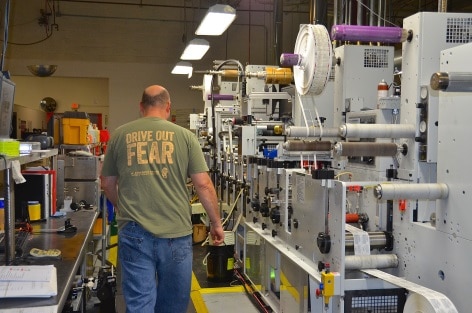
You can’t walk 20-feet in New York Label & Box without seeing that the entire workforce embraces the Deming Philosophy and walks the talk.
Steven and New York Label have done a lot of things right with Deming over the past twenty years. They have advanced their effectiveness, efficiency and quality rating. The culture they created, including driving out fear and instilling pride in their work; what Deming called “joy of work”, are all big advantages for the company. However, the biggest advantage New York Label has realized through implementing Deming has been the company’s ability to focus on innovation. That innovation equates to a strong differentiator and competitive advantage in the marketplace. As Kelly points out, “The printing business is a tough market to be in. But New York Label not only was able to weather the last recession, but actually grew and prospered during it.”
A Few Words Of Advice
While Steven is upbeat about the prospects for New York Label, he is less so about what he sees in American businesses today. He is quick to point out the difficulties some of the biggest automakers are currently facing, including large-scale recalls, multi-million dollar class-action lawsuits and stepped up government involvement. Questioning the aim and purpose of these companies, he wonders, “Is quality important to the leaders of the auto industry today? If so, how come I never hear them mention it as a factor for the problems their companies’ are having?” He believes a lack of quality is leading them and our nation down a slippery slope that may in fact be the harbinger of another economic downturn.
Steven also is troubled by the lack of awareness of Deming in American business, and how poorly those business leaders that know of him understand Deming. “They say to me, I never hear of Deming. And if I’ve never heard of him, how can he be worth anything? Or, why should I continuously strive for quality improvement? I’m making money. My business is successful!” However, for those business leaders who are willing to listen to what Steven has to say about Deming, particularly those who are thinking about implementing his management philosophy, he offers 6-points of advice.
- Have a 5-year plan, with constancy of purpose, and a vision to get the entire company to understanding that everyone is part of the transformation
- Hire an outside consultant that has a complete understanding of Deming
- Hire or appoint someone in the company to be a go-to-person, spearheading the improvement process, and training the management team (workers accept and implement Deming quickly because you are empowering them, taking away fear, and giving them the tools they need.)
- Read everything you can get your hands on to have a better understanding of Deming, while working with the outside consultant and internal champion
- Improve quality, understand systems thinking and optimize the system
- Make sure you have clients that are bragging about your products and services (the ultimate measurement of success)
If you would like to discuss these 6-points of advice with Steven, or learn more from him about how the theories and teachings of W. Edwards Deming helped him transform New York Label & Box into a thriving small business, he would be more than happy to speak with you. Of course, that’s exactly what you would expect from someone who is on a mission “to once again show the power of Deming’s methods."
